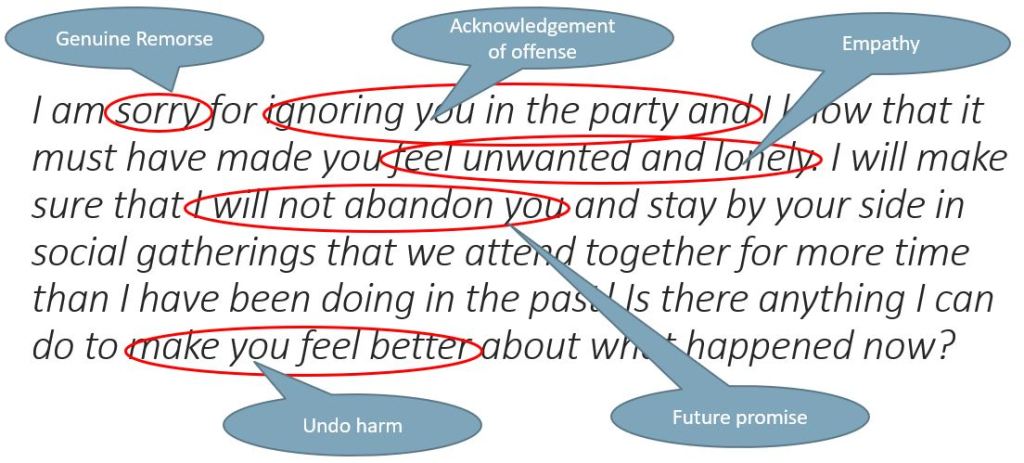Just don’t say ‘sorry’. Learn how to say it for it to be effective!
Last week I wrote about forgiveness and how it is important to forgive others so that you can move on. It is almost evident to me that I should then write about the art and science of apology this week.
How many times have you heard someone tell you that they are sorry and yet you do not feel like forgiving them? The mere act of ‘saying’ sorry is hardly enough to feel forgiveness or compassion for the perpetrator of hurt and pain.
An effective apology needs to be genuine and heartfelt. But that is not all that an apology should be. It needs to fulfill certain criteria for it to hit home. An effective apology leads to holistic forgiveness, where the situation can be resolved once and for all. It can help you remove the elephant from the room which can otherwise linger for weeks, months, and sometimes a lifetime.
The 5 Parts to an Effective Apology
According to Dr. Aaron Lazare of the University of Massachusetts, an apology needs to have the following components:
1. Remorse
This is the most basic part of an apology. One can assume if the apology is genuine, then there is remorse on the part of the person who has hurt you or given you pain. In addition to that, there also needs to be an element of humility in the approach. An apology coming from a place of pride indicates that you are really not sorry for what happened and therefore, it indicates that you still condone your actions or words!
2. Acknowledgment of the offense
Just saying you are sorry, even if it is genuinely said, does not assure another that you really know what you are apologizing for. A very common occurrence in relationships where there is a lot of argument and apologies are thrown at each other after the storm settles. But does either party know what exactly is being apologized for? If you want to make an effective apology, your sorry should include what specifically you are sorry for. You actually might find that what you assumed may not be the thing that hurt the other individual and you may find yourself apologizing for something completely different!
3. Empathy
Your apology can be genuine and effective only if you have gone through the process of understanding the hurt you have caused. It requires you to put yourself in the other person’s shoes and assess the kind of pain that they may be going through. If you are indeed looking for forgiveness, you may need to walk in their shoes for a mile. If you said something that hurt someone, understand the effect that it may have had, the insecurities that it may have unearthed, the expectations that the words may have shattered!
4. Attempt to undo the harm
Up until now, you have created an apology that is heartfelt, genuine, and remorseful for a specific action you did while understanding the situation you put the other person into. An added dose of an attempt to undo the harm helps in making it more effective. It adds proof of genuineness to what you are saying if you are willing to undo the harm in whatever way possible (if at all).
5. Future promise
An apology for something that you did that you know is likely to happen over and over again is meaningless. Sometimes, there are personality traits that clash and if you know that you will need to work on your anger or sarcasm to be able to control your actions in the future, you need to make it known that you will do everything in your power to work that part out. This may mean explaining how you plan to control yourself in the future to emphasize the authenticity of your promise.
It is also important to mention that an effective apology never includes an excuse or explanation for why you behaved in a hurtful manner. This only tries to pin the blame on someone else, something else, or the victim themselves.
An example of an effective apology would be: I am sorry for ignoring you completely at the party and I know that it must have made you feel unwanted and lonely. I will make sure that I will not abandon you and stay by your side in social gatherings that we attend together for more time than I have been doing in the past! Is there anything I can do to make you feel better about what happened now?

How Does an Effective Apology Help?
When you create your apology with all the factors mentioned above, there are a few things that happen in the process.
- You restore the dignity of the person who has been offended as the person understands that you acknowledge that you have done something that should not have happened.
- An effective apology also affirms that both parties have a shared understanding of the harm that was done. This shared understanding helps in re-building trust in the future.
- It validates that the victim was not responsible for the offense. Do remember, too, that an effective apology never includes an excuse for your behavior.
- It helps establish that the victim can feel assured that a repeat offense will not occur or at least specific steps will be taken to ensure that it does not happen again.
- As the apologizer tries to undo the harm, it provides some reparative justice in the minds of the victim that helps them forgive and move ahead!
An effective apology is the first step towards being forgiven. It is also important that you do not go with expectations of being forgiven immediately. Some people may take time to process what you have said and committed to.
An effective apology is also not the end of the problem and there is likely to be enough work that will need to be done on the relationship to get it back to where it was. But sometimes an effective apology followed up with specific reparative actions can build stronger bonds than ever before!


Great article!
Thank you, Vipra. Your appreciation means a lot.